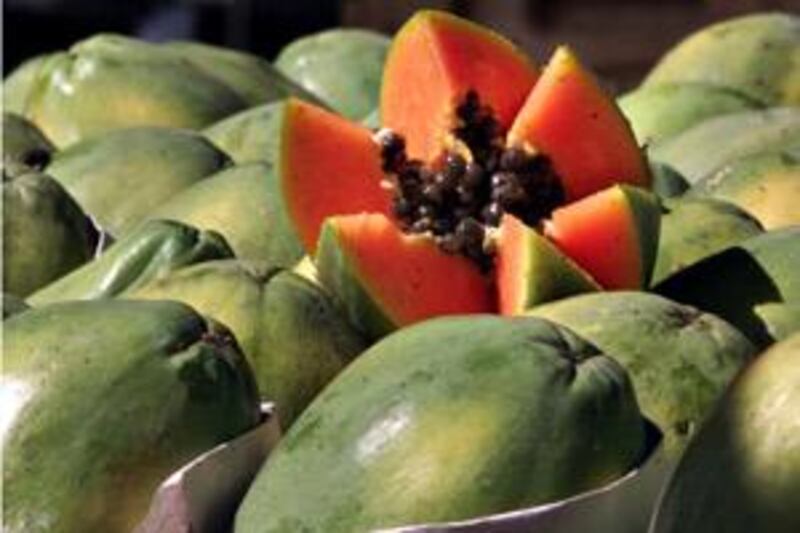As the temperature gets cooler over the next few weeks, many of us will head back outside after a long summer indoors. Nothing beats the clear blue skies of the UAE in the winter months, but for many of us that also means parched and sun-damaged skin. If you rely on a concoction of expensive creams, lotions and serums to keep your skin looking radiant, you may also want to take a look at what's on your dinner plate. Research continues to show that the foods you eat can play a vital role in keeping skin looking its best.
Also known as linseeds, tiny flaxseeds pack a powerful punch when it comes to keeping skin looking healthy. A study published last year in the British Journal of Nutrition found that after receiving a daily dose of flaxseed oil for 12 weeks, women not only experienced better skin hydration, but also had significantly less red, rough and scaly skin. Often touted for their link to heart health, flaxseeds are loaded with alpha linolenic acid, a type of omega-3 fatty acid that keeps skin hydrated and healthy looking.
Green tea continues to make its mark as a superfood thanks to studies suggesting it may contain potent skin healing properties. This of course is in addition to the long list of other health benefits that green tea has to offer, including protecting against heart attack and arthritis. As for healthy looking skin, green tea can't be beat. It's easy to prepare, inexpensive and loaded with powerful disease-fighting antioxidants called polyphenols. Studies have shown that green tea has strong anti-inflammatory properties and may even play a role in the prevention of skin cancer caused by the sun's ultraviolet rays. Enjoy it hot or make a pitcher of green tea iced tea with a squeeze of fresh lemon for an ultimate hot weather pleaser.
This tropical fruit gets two thumbs up when it comes to younger looking skin thanks to its exceptional vitamin C content. In 2007, researchers studying the association between nutrient intakes and skin ageing appearance found that women between the ages of 40 and 74 who consumed the most vitamin C had the least wrinkles. The findings aren't entirely surprising; vitamin C is a powerful antioxidant that plays a role in the synthesis of collagen, a protein responsible for skin elasticity that is often used in cosmetic surgery. Researchers found that women with the highest vitamin C intake also experienced less visible skin dryness. Apart from papaya, other excellent sources of vitamin C include kiwi, strawberries, tomatoes, red bell peppers and oranges.
In case you need another reason to eat your greens, research in Australia suggests that a high intake of fruit and vegetables, specifically green leafy vegetables, may protect against skin cancer. In the study, researchers followed more than 1,300 people for 11 years and found that the people who consumed the most fruit and vegetables were half as likely to develop skin cancer compared to those who skipped out on daily servings. Researchers found that the protective effect was due in part to a high intake of green leafy vegetables. The benefits of green leafy vegetables don't stop there. They are packed with vitamins A, C and K, contain a hefty dose of folate and are known to lower the risk of heart attack and stroke as well as promote brain health. Green leafy vegetables aren't just lettuce and spinach; this family includes kale, Swiss chard, rapini, collard green and beet greens.
Almonds are hard to beat when it comes to healthy looking skin. They are rich in vitamin E, a powerful antioxidant that protects cells against damage caused by free radicals. Some studies have shown that vitamin E may help prevent damage to skin cells caused by ultraviolet rays. Almonds also have the added benefit of being a great source of essential fatty acids, which can help keep skin hydrated and supple. Other sources of vitamin E include sunflower seeds, wheat germ, olives and spinach.
Drinking plenty of water is one of the easiest, least expensive and most effective ways to keep skin looking its best. From flushing toxins out of the body to transporting important nutrients, water wears many different hats when it comes to keeping the body in top form, and skin health is no exception. Water keeps skin cells hydrated and plump and can also prevent dry, flaky skin.
The bottom line is that while some foods may reduce wrinkles, protect against sun damage and keep your skin looking its best, nothing can replace proper skincare, including sun protection. That means wearing sunscreen, loose fitting clothing and a hat to protect against harmful ultraviolet rays.





